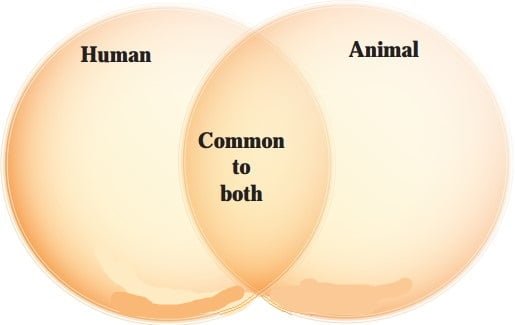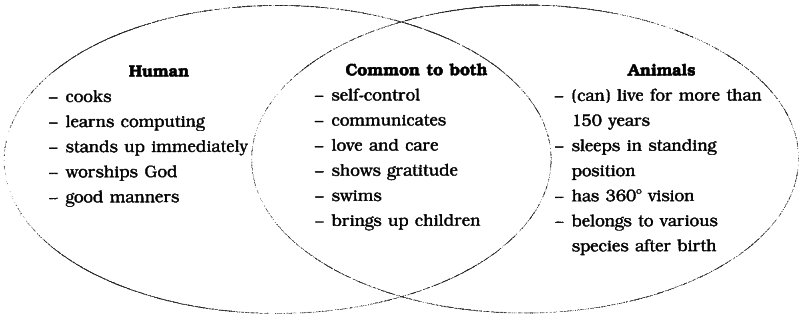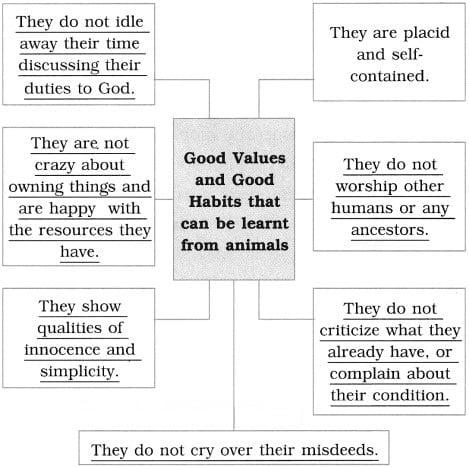Unit 2.1 Animals
Question 1.
Get into pairs and attempt the following :
“The more I learn about people, the more I like my dog.”- Mark Twain. – Discuss with your partner what Mark Twain means from the above quote.
Write in your own words
…………………………………………………………..
…………………………………………………………..
…………………………………………………………..
…………………………………………………………..
…………………………………………………………..
…………………………………………………………..
…………………………………………………………..
Answer:
‘The more I learn about people, the more I like my dog. – Mark Twain.
Ely the above quote, Mark Twain means that his dog has certain qualities which he finds lacking in human beings. Each day, as he comes across different people and learns more about human nature, the feeling grows within him that humans possess many disagreeable qualities that do not help in improving relationships. As a result, he begins to love his dog more than human beings.
Question 2.
Put the following attributes/abilities given below in the proper circles.
(a) self-control
(b) communicates
(c) love and care
(d) cooks
(e) good manners
(f) has 3600 vision
(g) shows gratitude
(h) lives for more than 150 years
(i) swims
(j) learns computing
(k) worships god
(l) sleeps in standing position
(m) stands up immediately after birth
(n) brings up children
(o) belongs to various species

Answer:

Question 3.
At times, especially when you are frustrated, you wish you were an animal/ a bird/ a fish/ a butterfly and not a human being.
Say which of the above you would choose to transform to and give 3 or 4 reasons for your choice.
I wish I could be a ………………………………………..
…………………………………………………………………….
…………………………………………………………………….
Answer:
When I am frustrated, I wish I could be a bird, so I could fly away from the cause of frustration. At such times, I would like to be far from the noise and crowd on earth and sail in silence across the sky. I would prefer to concentrate on my own thoughts and regain my peace, and the best place for that would be the vast open sky. Flapping my wings would keep me active and busy and help me forget about my worries.
Question 4.
We come across many animals in our vicinity. We have also read about different animals in books. Make a list of all animals that fall under various categories. One is given for you.
Amphibians | Mammals | Wild Animals | Aquatic Animals | Pet Animals |
frog | cow | lion | octopus | cat |
Answer:
Amphibians | Mammals | Wild Animals | Aquatic Animals | Pet Animals |
frog | cow | lion | octopus | cat |
toad | bat | tiger | crocodile | dog |
salamander | squirrel | bear | alligator | guinea pig |
caecilian | mongoose | wolf | hippopotamus | gold fish |
cheetah | turtle | |||
leopard | ||||
monkey |
Question 1.
(A) Match the words given in table A with their meanings in table B.
No | (A) Words | (B) Meaning | |
(i) | whine | (a) | an offense against the religious or moral law |
(ii) | sin | (b) | complain in an annoying way |
(iii) | evince | (c) | craze |
(iv) | mania | (d) | failing to take proper care |
(v) | negligent | (e) | show |
Answer:
No | (A) Words | (B) Meanings | |
(i) | whine | (b) | complain in an annoying way |
(ii) | sin | (a) | an offense against the religious or moral law |
(iii) | evince | (e) | show |
(iv) | mania | (c) | mental illness |
(v) | negligent | (d) | failing to take proper care |
(B) Find adjectives from the poem which refer to positive and negative thinking
Positive | Negative |
1……………………………. | 1……………………………. |
2……………………………. | 2……………………………. |
3……………………………. | 3……………………………. |
Answer:
Positive | Negative |
(1) placid | (1) dissatisfied |
(2) self-contained | (2) demented |
(3) unhappy |
Question 2.
Complete the following.
(a) The poet wishes he could ……………………………….
(b) Animals do not complain about ……………………………….
(c) Animals do not merely discuss ……………………………….
(d) Animals are not crazy about ……………………………….
Answer:
(a) The poet wishes he could turn and live with animals.
(b) Animals do not complain about their condition.
(c) Animals do not merely discuss their duty to God.
(d) Animals are not crazy about owning things.
Question 3.
State whether the following statements are true or false.
(a) Animals are self-reliant. ……………………………….
(b) Animals quarrel for their possessions. ……………………………….
(c) Animals do not worship other animals. ……………………………….
(d) Humans have given up many good qualities. ……………………………….
(e) Animals suffer humiliation. ……………………………….
(f) The poet has retained all his natural virtues. ……………………………….
Answer:
(a) True
(b) False
(c) True
(d) True
(e) False
(f) False
Question 4.
With the help of the poem find the differences between animals and human beings.
Human beings | Animals |
Always complain about their condition | Never complain about anything |
………………………………….
|
………………………………….
|
Answer:
Human Beings | Animals |
Always complain about their condition. | Never complain about their condition. |
Spend sleepless nights regretting their sins. | Don’t regret their sins at all. |
Sicken others by discussing their duty to God. | Do not discuss their duty to God. |
Always dissatisfied. | Always contented. |
Crazy about acquiring possessions. | Never interested in owning things. |
Worship other human beings. | Never worship anyone of their kind. |
Always unhappy about earthly matters. | Unconcerned about earthly matters. |
Question 5.
Read the text again, and complete the web, highlighting the good values/habits which we can learn from animals.
Answer:

Question 6.
Find outlines from the poem that are examples of the following Figures of Speech.
Figures of Speech | Lines |
Repetition | ………………………… |
Alliteration | ………………………… |
Hyperbole | ………………………… |
Answer:
Figures of Speech | Lines |
Repetition |
I stand and look at them long and long They do not sweat and whine …
|
Alliteration |
Not one is dissatisfied, not one is demented …
|
Hyperbole | … Not one is respectable or unhappy over the whole earth. |
Question 7.
Identify the Figures of Speech in the following lines.
(a) I stand and look at them long and long.
………………………………………………………………..
(b) They do not sweat and whine about their condition.
………………………………………………………………..
(c) They do not make me sick discussing their duty to God.
………………………………………………………………..
(d) …… not one is demented with the mania of owning things.
………………………………………………………………..
(e) They bring me tokens of myself.
………………………………………………………………..
(f) No one is respectable or unhappy over the whole earth.
………………………………………………………………..
Answer:
(a) Repetition
(b) Tautology
(c) Alliteration
(d) Hyperbole
(e) Paradox
(f) Hyperbole
Question 8.
Read the poem again and write an appreciation of the poem in a paragraph format with the help of given points. (Refer to page no. 5)
Answer:
Point Format
(for understanding)
The title of the poem : Animals’
The poet : Walt Whitman
Rhyme scheme : free verse (no rhyme scheme)
Figures of speech : Repetition, Alliteration. Tautology, Hyperbole, etc.
The theme/central idea : Animals are better than humans.
Paragraph Format
The poem ‘Animals’ has been penned by Walt Whitman.
The poet has broken away from the conventional use of a rhyme scheme and has written the poem in free verse.
The chief figure of speech used in the poem is Repetition. Lines such as ‘They do not sweat …’. ‘They do not lie awake …’. ‘They do not make me sick …’ make a strong impact, expressing the qualities that humans should possess, but do not. The other figures of speech are Alliteration, Tautology, Hyperbole, etc.
The central idea of the poem is that animals today are better than humans
Question 9.
Divide the class into two groups. One group should offer points in favor of (views) and the other against (counterviews) the topic ‘Life of an animal is better than that of a human being.’
Later use the points to express your own views/counterviews in paragraph format in your notebook.
Answer:
Point Format
View | Counterview |
Animals are placid and self-contained. | Animals cannot improve their lot in life. |
Animals do not try to set targets or achieve goals. Humans do. | By setting targets, goals are achieved. |
Animals do not complain about their condition. | It is only by complaining that one comes to know how things can be improved. |
Animals are self-satisfied with their condition, whatever it be. | Humans continuously try to improve their living conditions. |
Animals do not worship other things or animals or persons as gods. | Animals have no idea about God. Humans acknowledge a divine Creator. |
Animals do not worry about possessions or earthly matters. | Animals have no care about the future of this planet. Humans do. |
Question 10.
What craze do animals never display?
Answer:
Animals never display the craze of owning things.
Question 11.
What could have happened to the tokens of the poet’s self?
Answer:
The tokens of the poet’s self might have been lost from the time man resorted to manipulating nature and considered himself apart from it.
Question 12.
What does the poet mean by ‘They bring me tokens of myself?
Answer:
By ‘They bring me tokens of myself the poet means that animals possess and express visible signs of qualities such as innocence and simplicity that he himself (i.e. all human beings) must have possessed.
Question 13.
Give one example of a Rhetorical Question from the poem. Explain.
Answer:
Did I pass that way huge times ago and negligently drop them?
The poet uses a question to assert that we human beings unmindfully discarded the good qualities that we possessed somewhere along the line.